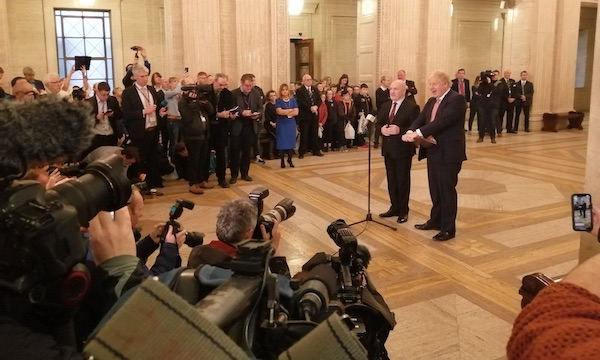
Disingenuous and almost sarcastic comments by British Prime Minister Boris Johnson on his first visit to the Belfast Assembly have underlined a sense that politicians at Stormont have been left to fend for themselves despite a new effort to ‘make Northern Ireland work’.
A new talks agreement, “New Decade, New Approach” helped bring about the restoration of the Six County Assembly and power-sharing Executive last week, three years after they collapsed.
But the arrival into Belfast of a good-humoured but clearly disconnected British Prime Minister suggested that Johnson was more interested in good publicity and taking the credit, while the Dublin government was sidelined.
“The British are arriving through the front door, while the Irish have to use the tradesman’s entrance,” one reporter from the 26 Counties noted, as the media assembled for the press conference.
Taoiseach Leo Varadkar and Tanaiste Simon Conveney were kept out of sight by British civil servants as Johnson addressed journalists in Stormont’s Great Hall, which serves as the entrance to the Assembly.
The PM’s carefree demeanour was boosted by the fact that the mainstream media had supplied him with their questions in advance. And smiling wryly, he mocked Tony Blair’s infamous soundbite following the signing of the Good Friday Agreement.
“Never mind the hand of history on my shoulder, I see the hand of history... no ... I see the hand of the future beckoning us all forward,” he said, with thinly disguised insincerity.
“We are going to be supportive but it’s not just about money,” he added. But for the main parties, who had hoped big spending could boost their support, it was a shock. It emerged that the lack of dates or deadlines for British financial promises meant that, in reality, little ready cash will be available in the medium term.
Former DUP Finance Minister Sammy Wilson said all the parties to the agreement had been cheated. “All the parties drew up this enormous wish-list without securing the money to deliver it,” he said.
“[Sinn Féin Minister for Finance] Conor Murphy is facing an uphill job but there’s no point in him moaning about it. The parties don’t have any leverage any more. The Secretary of State knows that they aren’t going to walk out of the Executive.”
Unionists welcomed the return of their veto powers, although those were slightly curtailed. Also lowering their expectations were Irish language activists, who won legislative changes, but not their goal of a full Irish Language Act.
Conradh na Gaeilge activists said the proposals “fall far short of the commitments made in the 2006 St Andrew’s Agreement”, while Irish-language activist Janet Muller, former director of Pobal, said the proposals are “weak and will not adequately protect and promote the Irish language”.
There was also evidence that the multi-party coalition is already under strain. The appointment of Sinn Féin’s Alex Maskey as Assembly Speaker with the surprising support of the DUP, angered both the nationalist SDLP and Alliance Party.
SDLP leader Colum Eastood was particularly indignant that his party’s Patsy McGlone had not been given the post, pointing to what he said was a previous agreement. Unionist hardliner Jim Allister of the TUV also denounced Maskey’s ‘baggage’, while the veteran republican wasn’t shy about taking on opponents in the chamber.
Mr Maskey challenged SDLP’s Colin McGrath, accusing him of insulting him during a debate at Stormont. He told the chamber that the SDLP chairperson had come up behind him at the Speaker’s podium and insulted him, and that it was the second time it had happened.
“I won’t tolerate Colin McGrath insulting the Speaker in the middle of a plenary debate,” Mr Maskey said. “In future I will take action, I want people to take note of that.”
![[Irish Republican News]](https://republican-news.org/graphics/title_gifs/rn.gif)
![[Irish Republican News]](https://republican-news.org/graphics/title_gifs/harp.gif)

